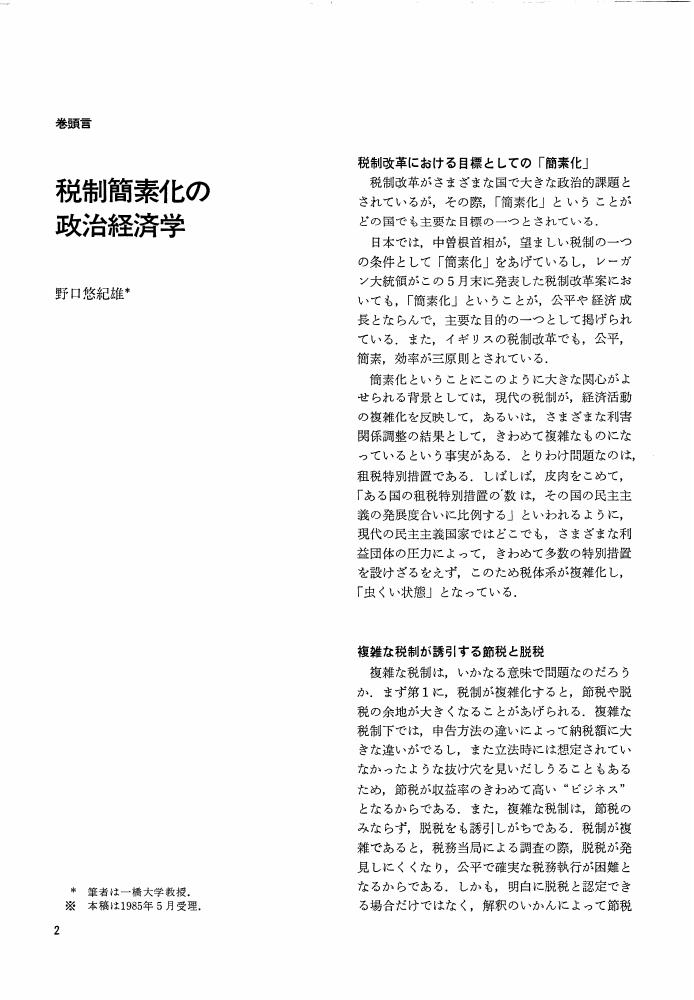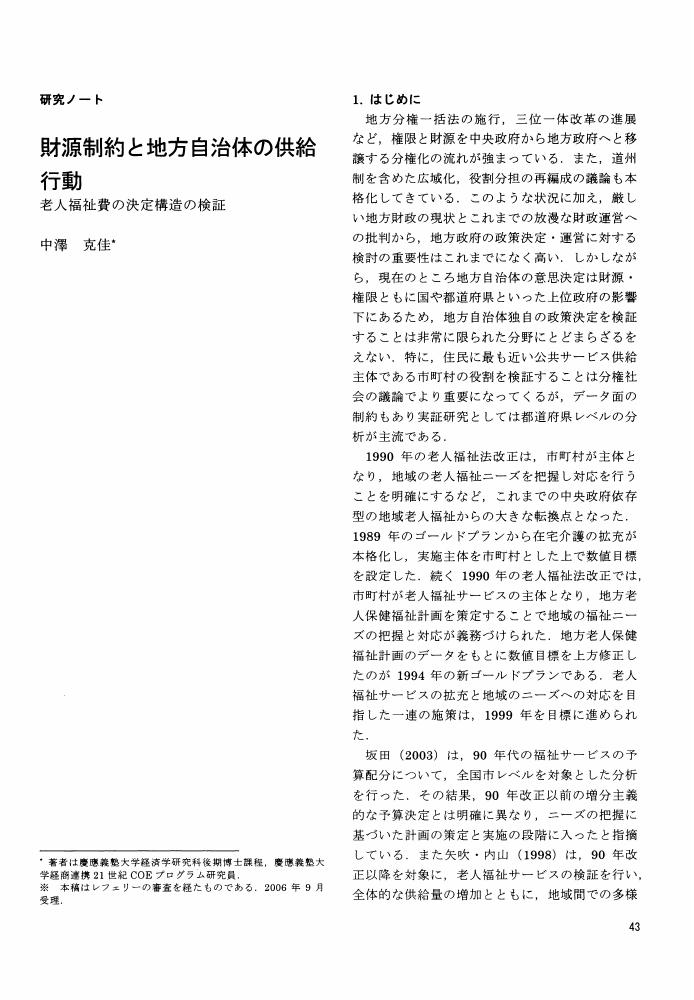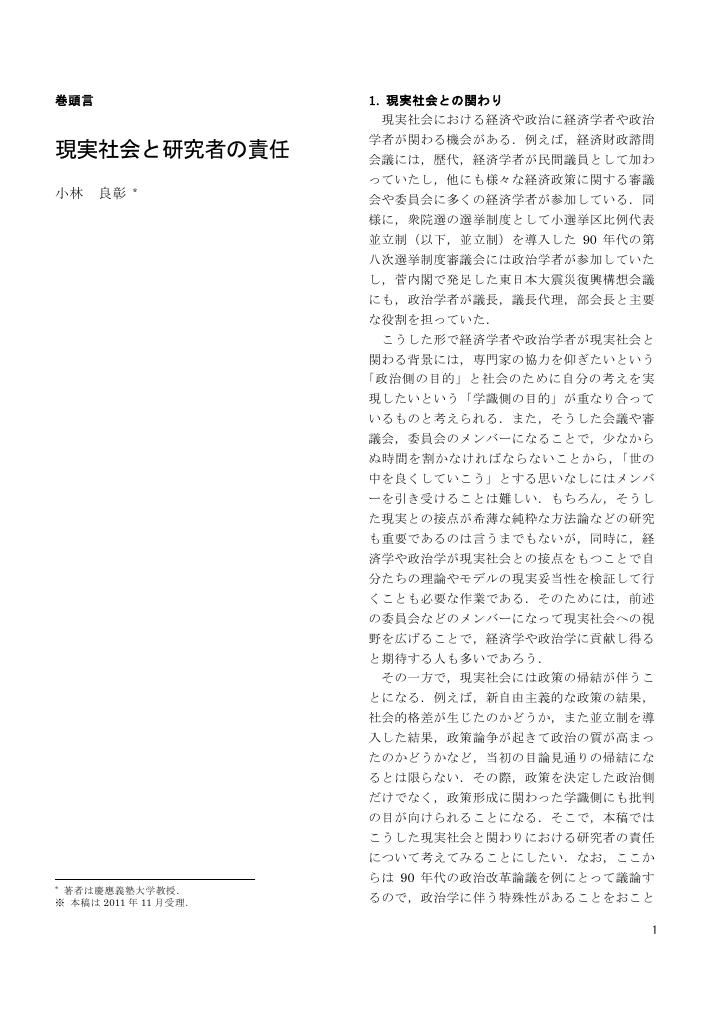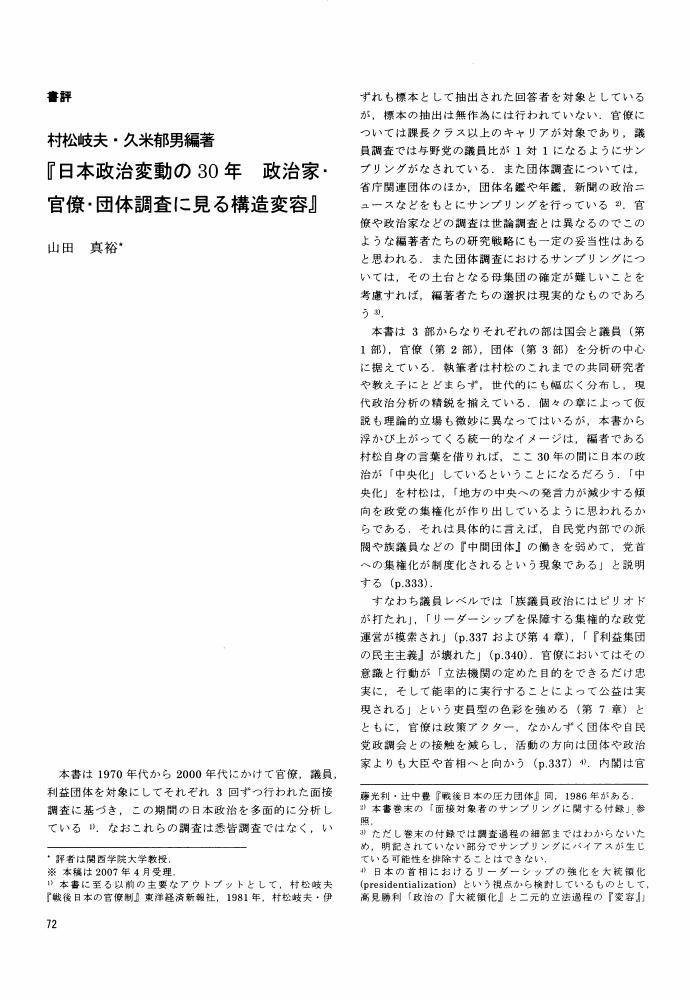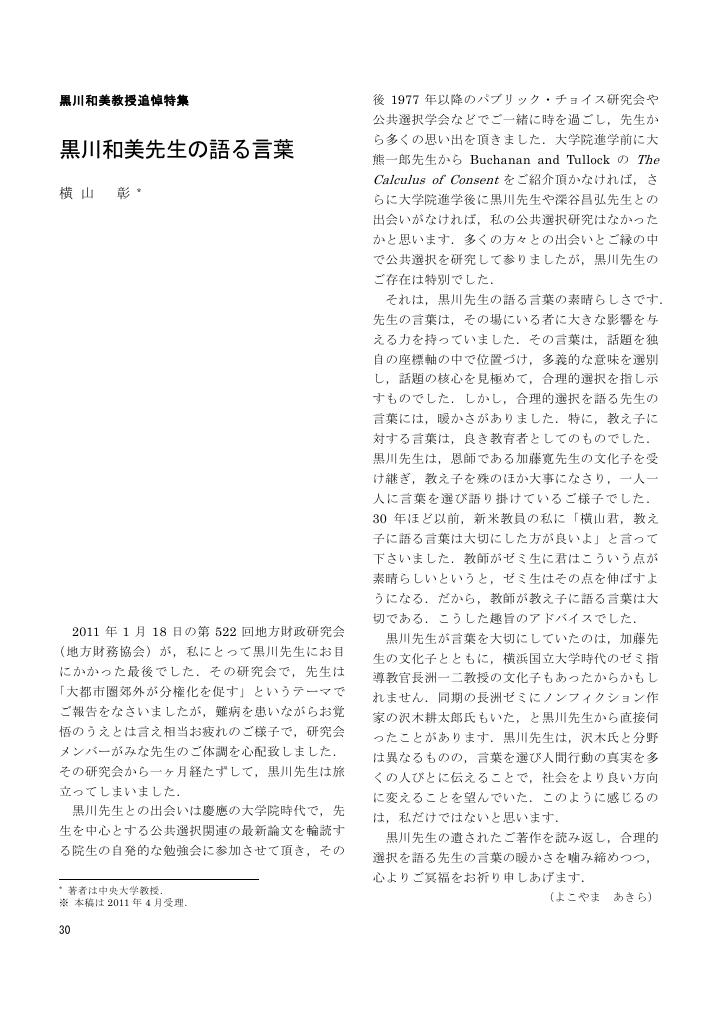82 0 0 0 OA 特別交付税における官僚の影響に関する分析*
- 著者
- 湯之上 英雄
- 出版者
- 公共選択学会
- 雑誌
- 公共選択の研究 (ISSN:02869624)
- 巻号頁・発行日
- vol.2005, no.45, pp.24-44, 2005-12-05 (Released:2010-10-14)
- 参考文献数
- 16
Recently Japanese government carries out the structural reforms on relation between central and local government. The reconsideration of local allocation tax grants is one of the most important themes in Japan.Local allocation tax grants, which contain“ordinary local allocation tax grants”and“special local allocation tax grants”, are required to operate objectively. Ordinary local allocation tax grants have rigorous formula of determining the amount of grants, so it is considered that there are no interventions from any participant, such as politicians or bureaucrats.However when it comes to special local allocation tax grants, there has less rigorous formu-las than ordinary grants, it is wondered that bureaucrats are able to control the amount of the grants.First, we construct a theoretical model which describes the bureaucrat's behavior. There are two type bureaucrats, incumbent and retiree, who are over lapped in the economy. We show that both incumbent and retired bureaucrats choose a trigger strategy which supports positive transfers from incumbent bureaucrats to their seniors.Second we estimate the regression model that formulates the structure of grants. The empirical results support our theoretical model; there are positive transfers from present bureaucrats to senior ones who become now local governors. We also find the positive correlation between the grants and intergovernmental personnel exchanges. In other words the increase in the number of central government officers admitted to the local government leads to the increment of special local allocation tax grants. With using the estimators and explanatory variables, we calculate the amount of the influences of bureaucrats on special local allocation tax grants. It is estimated that about 50% of total amount of special local allocation tax grants are determined by influences of bureaucrats.
20 0 0 0 OA 行動経済学と神経経済学は標準的経済学を変えるのか
- 著者
- 瀧澤 弘和
- 出版者
- 公共選択学会
- 雑誌
- 公共選択の研究 (ISSN:02869624)
- 巻号頁・発行日
- vol.2010, no.54, pp.67-75, 2010-08-15 (Released:2013-07-31)
- 参考文献数
- 39
19 0 0 0 OA 税制簡素化の政治経済学
- 著者
- 野口 悠紀雄
- 出版者
- 公共選択学会
- 雑誌
- 公共選択の研究 (ISSN:02869624)
- 巻号頁・発行日
- vol.1985, no.5, pp.2-5, 1985-09-15 (Released:2010-10-14)
17 0 0 0 OA 所得格差,汚職,経済成長
- 著者
- 水野 伸宏
- 出版者
- 公共選択学会
- 雑誌
- 公共選択の研究 (ISSN:02869624)
- 巻号頁・発行日
- vol.2011, no.56, pp.48-52, 2011-07-15 (Released:2014-07-13)
- 参考文献数
- 10
15 0 0 0 OA 首相の辞任と支持率*
- 著者
- 増山 幹高
- 出版者
- 公共選択学会
- 雑誌
- 公共選択の研究 (ISSN:02869624)
- 巻号頁・発行日
- vol.2001, no.37, pp.14-24, 2001-12-15 (Released:2010-10-14)
- 参考文献数
- 37
In this study I try to understand how the approval rating of the Prime Minister affects the probability of his resignation. My analysis relies on the statistical technique of duration modeling, which can be used to explore the effects of independent variables on the occurrence and timing of an event of interest. By applying a discrete-time model on the data set of the postwar Japanese Prime Ministers, I show that the probability of the Prime Minister resigning not only increases over his term in office, but also depends on his ability to gain public support.
11 0 0 0 OA 財源制約と地方自治体の供給行動
- 著者
- 中澤 克佳
- 出版者
- 公共選択学会
- 雑誌
- 公共選択の研究 (ISSN:02869624)
- 巻号頁・発行日
- vol.2006, no.47, pp.43-54, 2007-01-15 (Released:2010-10-14)
- 参考文献数
- 20
11 0 0 0 OA 育児支援施策をめぐる自治体間財政競争
- 著者
- 田中 宏樹
- 出版者
- 公共選択学会
- 雑誌
- 公共選択の研究 (ISSN:02869624)
- 巻号頁・発行日
- vol.2009, no.52, pp.25-36, 2009-07-05 (Released:2013-03-22)
- 参考文献数
- 32
This paper focuses on an optimal provision of public services for child care, considering them as local public goods. According to the fiscal competition theory, policy competition among local governments may not induce an optimal provision of local public goods. On the basis of this theoretical consequence, it examines, using an empirical method, whether or not public services for child care of local governments deviate from a level of optimal provision.More specifically, I verify whether or not there exits strategic interaction on public expenses for child care among local governments, by using cross section data of Japanese prefectures and estimating linear reaction functions, based on the welfare competition model adopted by Wildasin (1991). From the positive analysis, it can be seen that there is “strategic complement" in the decisions making of local governments. I therefore point out that public expenses for child care can actually deviate from an optimal level.
10 0 0 0 OA アメリカ政治学における数理モデルの衰退と実験の隆盛―因果効果の概念に着目して―
- 著者
- 飯田 健
- 出版者
- 公共選択学会
- 雑誌
- 公共選択 (ISSN:21872953)
- 巻号頁・発行日
- vol.2017, no.67, pp.46-65, 2017 (Released:2023-03-29)
- 参考文献数
- 34
This article claims that the recent prevalence of the concept of causality based on potential outcomes explains the decline of formal models and the rise of experiments observed in publication trends in political science in the United States. Observational data analysis, a mainstream approach in political science, necessitated formal models as strong theories to ensure empirical-statistical models to meet the conditions in the classical concept of causality, especially temporal precedence and the exclusion of alternative explanations for cause-effect linkages. Rather than specifying statistical models with the aid of formal models for causal inference, however, designing randomized experiments are the most straight-forward and desirable way of satisfying the conditional independence assumption (CIA) in the recently prevailing concept of causality based on potential outcomes. For this reason, the significance of formal models has been devaluated, and experimental methods have rapidly evolved with technological advances associated with the Internet, and have established its position in political science in the United States.
9 0 0 0 OA 地方自治体における政権交代と財政規律*
- 著者
- 藤澤 昌利
- 出版者
- 公共選択学会
- 雑誌
- 公共選択の研究 (ISSN:02869624)
- 巻号頁・発行日
- vol.2004, no.42, pp.20-33, 2004-07-05 (Released:2010-10-14)
- 参考文献数
- 22
Reducing public debt is one of the most urgent issues for local governments in Japan. In this paper, I focus on the political aspect of this problem and examine the relationship between fiscal efficiency and gubernatorial turnover in local governments. The main purpose of this paper is to assess the governors' Moral Hazard problem called “Kenpu-Jyunen.” (An epigram: Over ten years of the same administration makes governments corrupt.)Using panel data of 47 prefectures from FY 1976 to FY 1999, I find U-shaped relationship between the governors' tenure of office and the increase of the net debt and/or the primary deficit. More specifically, as the governor's tenure lasts, its administration becomes more efficient for up to twelve years. However when he keeps in power beyond twelve years (over three times of reelections), harmful effects of reelection turn out and it becomes less efficient. In addition, we find administration becomes more efficient as the governor's age of inauguration is high, and as the prefectural assembly is more solid in supporting the governor.This finding suggests that administrative and fiscal discipline in local governments could not work well due to the Moral Hazard when long tenure weakens the pressure of gubernatorial turnover. In the trend toward the decentralization, governors' authority and responsibility are supposed to be intensified. Correspondingly, we should have more profound discussion on the introduction of governor's term limits as a rule of democracy.
7 0 0 0 OA 理論的貢献と実証的貢献のトレードオフ:数理政治学の視点から
- 著者
- 浅古 泰史
- 出版者
- 公共選択学会
- 雑誌
- 公共選択 (ISSN:21872953)
- 巻号頁・発行日
- vol.2017, no.67, pp.66-84, 2017 (Released:2023-03-29)
- 参考文献数
- 26
This paper discusses the relationship between formal and quantitative analysis in political science from the point of view of the formal modeler. The first part details the two theoretical benefits of formal models that have no impact on empirical analysis: (i) the indication of each political system's important characteristics and (ii) normative analysis. In the second part, I discuss whether we should start analysis with formal or quantitative analysis when writing a paper based on theory and evidence. If we start with the construction of a formal model, we tend to face many difficulties, such as a scarcity of data. On the other hand, if we start with quantitative analysis, we tend to have less theoretical benefits, and readers may feel that a formal model is not necessary. Therefore, researchers should balance between theoretical and empirical contributions.
6 0 0 0 OA 現実社会と研究者の責任
- 著者
- 小林 良彰
- 出版者
- 公共選択学会
- 雑誌
- 公共選択の研究 (ISSN:02869624)
- 巻号頁・発行日
- vol.2011, no.57, pp.1-3, 2011-02-15 (Released:2014-11-17)
- 著者
- 佐野 亘
- 出版者
- 公共選択学会
- 雑誌
- 公共選択の研究 (ISSN:02869624)
- 巻号頁・発行日
- vol.2009, no.53, pp.83-87, 2009-12-15 (Released:2013-06-28)
- 参考文献数
- 1
5 0 0 0 OA 集合行為と社会的規範の進化
- 著者
- エリノア オストロム 木村 久徳 中村 まづる
- 出版者
- 公共選択学会
- 雑誌
- 公共選択の研究 (ISSN:02869624)
- 巻号頁・発行日
- vol.2010, no.54, pp.3-19, 2010-08-15 (Released:2013-07-31)
- 参考文献数
- 84
3 0 0 0 OA 知事のリーダーシップと広域連携への支持
- 著者
- 善教 将大
- 出版者
- 公共選択学会
- 雑誌
- 公共選択 (ISSN:21872953)
- 巻号頁・発行日
- vol.2021, no.76, pp.105-124, 2021 (Released:2023-03-29)
- 参考文献数
- 28
This paper examines the effect of Osaka citizens’ preference for the integration of Osaka city and prefecture government on their support for Hirofumi Yoshimura, a governor of Osaka prefecture. Many scholars point out that TV media have a strong influence on citizen attitudes, and Yoshimura’s high approval ratings are caused by the media effect. However, this paper argues that Osaka citizens’ preference for the integration of Osaka city and prefecture governments directly and indirectly result in Yoshimura’s consistent popularity. First, this preference indirectly affects the approval of Yoshimura via partisanship in local politics. Second, this preference also directly affects the approval for Yoshimura, because of the strategy of Osaka-Ishin-no-Kai, which aims to solve the problem of dual administration in Osaka. The results of the empirical analyses show that Yoshimura’s high approval ratings stem not only from perceptions of his political leadership abilities, but also from public support for the integration of Osaka city and prefecture governments.
3 0 0 0 OA 小田中直樹著 『ライブ・合理的選択論―投票行動のパラドクスから考える―』
- 著者
- 河野 武司
- 出版者
- 公共選択学会
- 雑誌
- 公共選択の研究 (ISSN:02869624)
- 巻号頁・発行日
- vol.2010, no.55, pp.68-70, 2011-01-15 (Released:2014-06-15)
- 参考文献数
- 9
3 0 0 0 OA 公的年金制度改革: 市場の失敗と政府の失敗の間で
- 著者
- 中村 まづる
- 出版者
- 公共選択学会
- 雑誌
- 公共選択の研究 (ISSN:02869624)
- 巻号頁・発行日
- vol.1999, no.32, pp.32-48, 1999-07-01 (Released:2010-10-14)
- 参考文献数
- 47
Pension program provides income distribution between younger workers and older retirees who would otherwise live in poverty on inadequate savings. The changing demographic structure of the population will result in a higher proportion of retirees to workers. The pay-as-you-go method of financing public pension is a crucial aspect of the current program and of its financial problem. If nothing were done to change the current program, it is likely that the social security tax rate would have to rise very rapidly in the years ahead, which might cause a public distrust in the program itself.Public management of the program has been justified in the view of“market failure”of social security in economics, however, it is apparent that“welfare state”has increased fiscal deficits among democratic countries. It is paradoxical that a demographic change is preventing the public management of social security attain the economic goal of not only efficiency but also equity because of financial difficulties.On the other hand, the public choice theory has pointed out that democratic decision making process results in income distribution through majority rule since its early stages. Now it is time that the basic structure of the public pension program has to be reexamined and reshaped to fit the economic conditions of today.The World Bank proposed how to reform social security programs. The proposal restricts the roll within minimum standard of living, while privatize its management into market mechanisms, which inspired various arguments the reform in Japan. The purpose of this paper is to examine the idea of constitutional reform to evaluate their performances, and propose the rules within the reform in order to prevent any rooms of government failure.
3 0 0 0 OA 古田精司教授追悼特集
- 出版者
- 公共選択学会
- 雑誌
- 公共選択の研究 (ISSN:02869624)
- 巻号頁・発行日
- vol.1995, no.25, pp.6-22, 1995-06-15 (Released:2010-10-14)
3 0 0 0 OA 村松岐夫・久米郁男編著『日本政治変動の30年 政治家・官僚・団体調査に見る構造変容』
- 著者
- 山田 真裕
- 出版者
- 公共選択学会
- 雑誌
- 公共選択の研究 (ISSN:02869624)
- 巻号頁・発行日
- vol.2007, no.48, pp.72-74, 2007-07-05 (Released:2010-10-14)
- 参考文献数
- 15
3 0 0 0 OA 黒川和美先生の語る言葉
- 著者
- 横山 彰
- 出版者
- 公共選択学会
- 雑誌
- 公共選択の研究 (ISSN:02869624)
- 巻号頁・発行日
- vol.2011, no.56, pp.30, 2011-07-15 (Released:2014-07-13)
- 参考文献数
- 1
2 0 0 0 OA 理論の変容:1990年代以降の国際関係論と公共選択論
- 著者
- 山本 和也
- 出版者
- 公共選択学会
- 雑誌
- 公共選択 (ISSN:21872953)
- 巻号頁・発行日
- vol.2015, no.64, pp.63-81, 2015 (Released:2023-03-29)
- 参考文献数
- 47
This paper discusses the change in the concept of theory in international relations (IR)studies that has been promoted by the prevalence of formal approaches in the field since the 1990s. The first two sections present the developments from the public choice theory perspective. The third section reviews the various arguments pertaining to this change by researchers specializing in qualitative approaches. While this paper agrees with the critics on some minor points, it argues that the critics'central claims are unacceptable. The fourth section discusses arguments pertaining to the change by IR academic organizations around the world. The concluding section relates the change in IR studies to broader social contexts.

